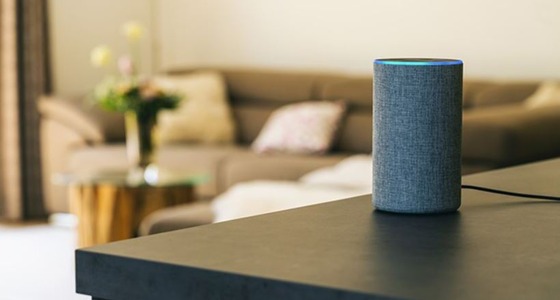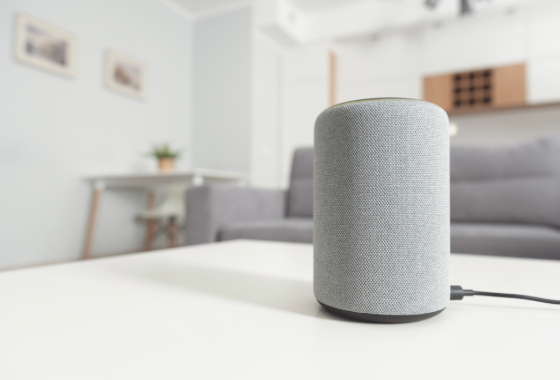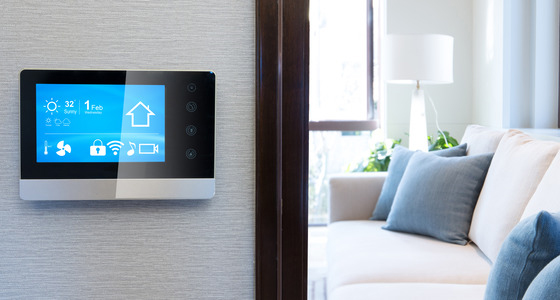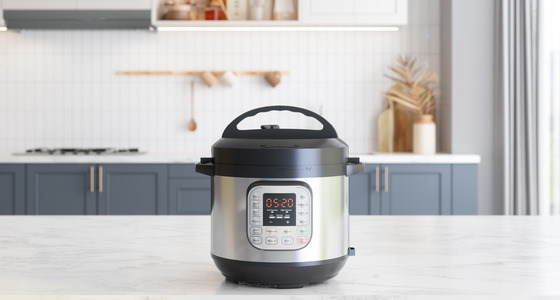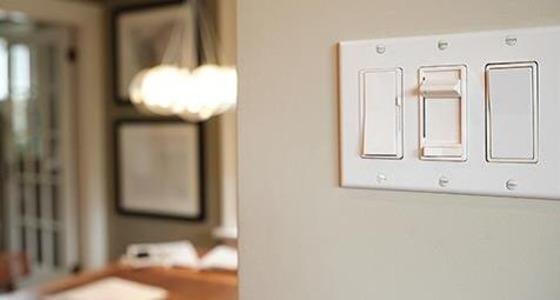Manage your electricity use, wherever you are
Smart devices like thermostats, appliances, and plugs, to name a few, are making life more convenient. Plus, being able to control different aspects of your home with your voice or your phone can help you manage your energy use and save on your electricity bill.
Smart devices can be controlled from anywhere using a smartphone. You can also program them to fit your schedule so they'll automatically adjust to your routine and household needs.
Types of smart home technologies
Here are a few areas that you can incorporate smart home technology to give your home's comfort and efficiency a boost.
Smart lighting
Replacing your traditional light switches with smart switches or dimmers gives you the power to turn your lights on or off from your phone, meaning if you left the kitchen light on when you left the house, you don't have to wait until you get home to turn it off.
Using smart light switches to control and set timers for your lights from your smartphone could save you around $10 a year.
Smart plugs
For task lighting, small appliances, or the curling iron you never remember to turn off, smart plugs are an easy option. Simply plug one into the wall, then plug your electronic of choice into the plug. From there, you can turn it on and off while on the go using your smartphone.
There are also smart power strips with multiple outlets.
Smart thermostats
Smart thermostats are an easy and efficient way to manage your home's temperature. Once installed, you can adjust the temperature from your smartphone or tablet. Plus, some models can learn when you’re home and adjust the temperature in your accordingly. This means comfortable temperatures when you're there, and no wasted energy when you're not.
Getting your smart thermostat to automatically lower the temperature to 16ºC when it senses you're away from home could save you around $55 a year.
Smart baseboard heating controls
Not all smart thermostats will work with baseboard heaters, but there are a number of smart line-voltage smart thermostats that do. Be sure to check the manufacturer and packaging to make sure they'll work with your heating system. Once installed, smart thermostats will connect to your home's internet, and you’ll be able to turn off your baseboard heating from anywhere.
Getting smart baseboard heating controls to turn off heat in empty rooms could save you around $150 a year.
Smart washers and dryers
Smart clothes washers and dryers are time-saving appliances that make laundry day a breeze. Set up custom cycles, get cycle-done alerts and start and stop your appliances remotely from your smartphone. Take the guesswork out of dryer times with automatic moisture detection that shuts off once the load is dry. Plus, you can set up a laundry schedule, which means you can program a load to start at a time that works best for you.
Smart kitchen appliances
Work smarter, not harder in the kitchen. You'll never leave the fridge door open too long with a smart refrigerator. Not only will you get an alert if someone leaves the door open, some models even display the contents of the fridge on a digital screen so you can find what you need without losing all the cold air.
Or, add some smart plugs to your countertop appliances and you'll be cooking with the tap of a smartphone or a simple voice command.
Smart load controllers
A smart load controller helps reduce energy use by limiting when your water heater runs, especially during times when hot water isn’t needed, like overnight or while you’re away. It can help lower your electricity bill, automate your water heating schedule, and support a more efficient grid.
It’s particularly beneficial if you’re on time-of-day pricing, and eligible models qualify you to earn rewards through our Peak Saver program.
Entertainment, security and more
There are many other types of smart home devices that aren't directly related to your energy efficiency. These include:
- Smart speakers
- Door locks and doorbells
- Security cameras, motion sensors and window/door sensors
- Moisture sensors
- Smoke alarms
- Air purifiers and more
Often, different brands can work together when coordinated within a smart home ecosystem – like an Amazon Alexa, Google Home or Apple Home kit – allowing all your devices to be monitored and managed together from your smartphone.
Smart speakers to control your devices
Most smart devices are controlled via apps on your smartphone. However for many devices, you can centralize and simplify your controls using a smart speaker like a Google Home or Amazon Echo. Now, you can turn on your lights or turn off your coffee pot all in one convenient, voice-activated place.
Do some research to find the best model for your home that's compatible with your smart devices and best suited to your preferences.
Home energy monitoring hubs
Want to be able to track how much electricity you're using in real time? Check out a home energy monitoring hub, like the two hub devices that pair with our HydroHome app. When you turn up the heat or start your dryer, your hub allows you to see how much electricity it's using, right then and there.
Hubs also unlock smart insights to help you save energy and allow you to control your smart devices through one centralized app.
If you're not interested in real-time energy data, take advantage of our free tools to track usage up to the previous day: energy data available in your online MyHydro account or our free HydroHome app without the optional hub.
